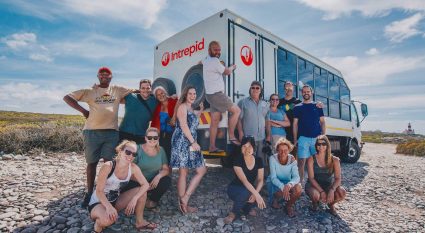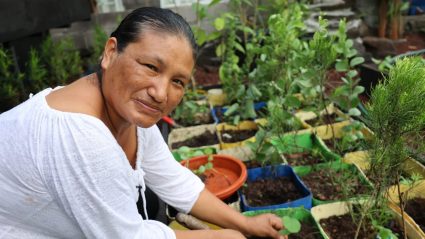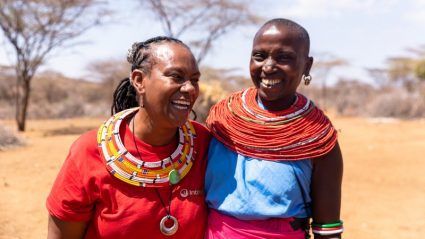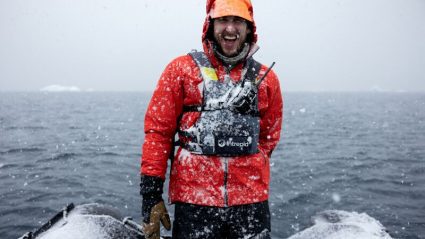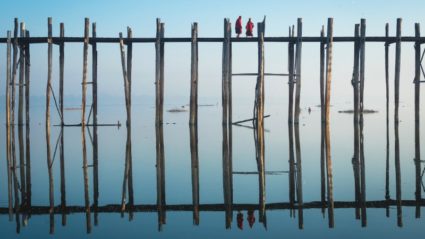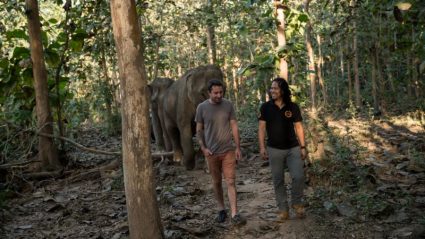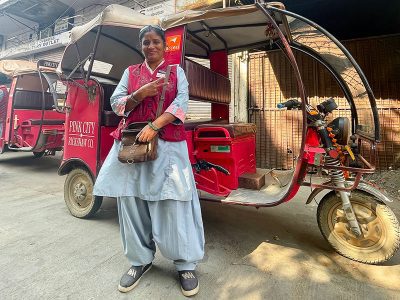Intrepid Group actively supports best practice child protection.
We to ensure that children and their families are protected from harm. The term ‘child protection’ refers to preventing and responding to violence, exploitation and abuse against children. This includes commercial sexual exploitation, trafficking, child labour and harmful traditional practices. Some children are more vulnerable to harm, with children living in poverty, areas of high tourism, without parental care, and in conflict with the law placed at the highest risk. Violations of a child’s right to protection take place in every country in the world. In addition to breaching human rights, these violations are also severely under-recognised and under-reported threats to a child’s survival and development. The Intrepid Group recognizes that exposure to tourism has the capacity to increase the risk of harm to children, and understands its responsibility and obligation to do no harm in the places we visit.
The Intrepid Group aims to provide fun, affordable and sustainable travel that is beneficial to local communities. We receive many enquiries from travellers interested in combining their travels with a positive opportunity to give back and bring benefits to others, possibly through volunteering. This is often called ‘voluntourism’.
The Intrepid Group is primarily a travel operator and we believe that is our strength. We have very long-standing and rich relationships with local communities, but we believe communities seeking assistance from volunteers are best served by specialist agencies.
There are many excellent volunteer agencies around the world that source and respond to community and organisational requests for volunteer assistance. To be very effective, these agencies need a range of specialised skills and they prioritise the needs of the hosting communities.
The Intrepid Group does not possess this specialised expertise and therefore we do not currently operate short-term volunteering opportunities.
Some experts have even warned that short-term volunteering isn’t always helpful. This can be for a variety of reasons, including:
- Organisations becoming dependent on the money that short-term voluntourists bring with them - leading to projects that address the wrong needs, manufacture new needs, or place the safety of children and communities at risk;
- Unprepared and untrained volunteers can do more harm than good – especially when dealing with children who often have complex needs and histories of abuse;
- Children can be harmed – many studies show that a constant stream of new visitors and volunteers, who often form close bonds of attachment with children in a very short period of time, can negatively affect early childhood development. This can cause learning delays, attachment disorders and difficult forming healthy relationships. These effects can be lifelong and intergenerational;
- A steady stream of volunteers results in a loss of jobs for locals – this impacts the health of the local economy and places families at risk.
More than eight million children live in residential care institutions globally, and of these children, between 70 and 90% have one or more living parents. Provided with the right support, in most cases these parents would be willing and able to take care of them.
What is a residential care institution?
Residential care refers to group living arrangements for children without primary caregivers, or whose biological parents are unable to care for them. It is meant to provide 24-hour care by paid staff, meeting children’s basic needs of shelter, food, clothing and education. These can be places of safety for emergency care, transit centres in emergency situations, and all other short and long-term residential care facilities including group homes. Other terms used for this form of care are institutional care and orphanages, children’s homes, shelter, boarding school, or children’s village.
The Intrepid Group is a member of ReThink Orphanages. ReThink Orphanages aims to decrease the unnecessary institutionalization of children by addressing the drivers of institutionalization – a major one being orphanage tourism.
Orphanage tourism is what happens when good intentions and reality don’t quite synch up. Travellers who visit and volunteer in orphanages may genuinely want to help, but their efforts can often perpetuate a system where children are separated from their families and, in some cases, abused.
The Intrepid Group does not offer travellers the opportunity to visit or volunteer at orphanages or residential care institutions as part of included or optional activities.
The Intrepid Group’s position on visiting and volunteering applies to all forms of residential care, including orphanages, shelters, transit homes, emergency centres, boarding schools, children’s villages, children’s centres, children’s homes.
Why is it harmful to visit or volunteer at a residential care institution?
- Orphanages are a lucrative industry and some operators prey on the good intentions of well-meaning visitors;
- The primary aim of orphanages or residential care institutions that offer visits or volunteer placements is not a need for an ‘extra pair of hands’ – it’s eliciting an emotional connection from visitors/volunteers, who are then moved to donate. This fuels the proliferation of orphanages, and the need to fill them with children;
- Allowing foreign, unskilled and transient strangers intimate access to vulnerable children is a major child protection risk;
- The constant rotation of adults coming in and out of vulnerable children’s lives creates attachment disorders – the effects of which are lifelong and intergenerational;
- A steady stream of visitors and volunteers to a child’s home violates their right to privacy;
- Children are not tourist attractions.
Children selling trinkets and souvenirs are participating in child labour and are at increased risk of harm from violence, abuse, and exposure to unsafe situations. Begging for money and food prevents children from accessing support services designed to keep them safe, healthy and at school.
The Intrepid Group does not support or encourage travellers to purchase souvenirs, trinkets or other items from child sellers, or give money or food to children begging.
When children are at school, they should be free to learn and play in a safe environment. Tour groups who visit schools can disrupt children’s ability to learn by visiting during class time, and also present a child protection risk.
Visiting schools and giving gifts also promotes a belief that all tourists are safe and perpetuates ideas of inequality. The Intrepid Group does not offer travellers the opportunity to visit or volunteer at schools as part of included or optional activities.
In the case of trips where the Intrepid Group is hosting school groups, the following guidelines should be followed:
-
No direct gifts should be given to students from the host school;
-
Visits should take place as part of a formal, pre-organised learning exchange between students of a similar age/year level;
-
Visits should be well planned and not extend beyond the pre-arranged time period.
Homestays are of increasing interest to travellers looking to immerse themselves in the culture of the destination they are visiting. However, homestays pose specific child protection risks to both travellers and the communities themselves.
Risks to communities
Many homestay communities may have had very little contact with tourists/foreign travellers, and therefore have minimal understanding of the risks involved. With tourism comes exposure to different cultures, customs and social norms, many of which will be vastly different to those of the host community.
Children in these communities are especially vulnerable to the impacts of tourism, and rely on the adults in their lives to protect them from harm. Unfortunately, as tourism can also be a new experience for adults in homestay communities, their understanding of the risks to children may be minimal too.
Specific risks to children in homestay communities include:
-
Risk of physical, emotional and sexual abuse from travellers who sleep, live and wander freely around communities;
-
Risk of exposure to inappropriate behavior/behavior that is not age appropriate.
Risks to travellers
While most travellers are aware of risks to their personal safety when travelling, and take steps to protect themselves, living in an unfamiliar community environment can increase these risks. Children who are travelling on Intrepid Group trips and staying in homestays are also vulnerable to abuse and violence in host communities.
It is important to be aware of these risks, and ensure that travellers are not alone with children in the host community, and that travelling children are always supervised by their guardians when in communities.
Visiting and interacting with local communities is part of the Intrepid Group travel experience. It is important to recognise that, like homestay communities, not all communities or community members will be familiar with engaging with foreign tourists.
The Intrepid Group seeks to minimize any harmful impacts on local communities and protect children by:
-
Not giving gifts to community members (including children);
-
Not engaging in physical contact with children (this includes hand holding, hugging, carrying children etc.);
-
Ensuring travelers are always supervised when in the presence of local children.
Many travelers like to bring gifts for children including toys, books, pencils and candy. The Intrepid Group does not support or encourage travelers to bring or purchase gifts for local children because:
- Gift giving promotes a belief that all tourists are safe and perpetuates ideas of inequality;
- Some children are part of organized begging syndicates, where they experience abuse and violence, and are forced to beg;
- When children receive gifts from travelers, they are more likely to miss school in order to beg ;
- Giving candy to children increases the risk of tooth decay and oral problems, which can cause significant damage in countries with minimal dental hygiene facilities;
- Many gifts are simply sold back to local stores.
The Intrepid Group chooses to work with accommodation suppliers who abide with our Supplier Code of Conduct.
If you see any of the following, please inform your line manager or General Manager:
- Children working in hotels, carrying bags, cooking, serving customers, or cleaning;
- Local children entering or exiting the hotel with foreigners;
- Local children entering or exiting hotel rooms;
- Local children being allowed into the hotel to beg or sell items to guests.
It is important to note that in many developing countries, children often work in family-run businesses before and after school, or during holidays. If you believe this may be the case, please discuss your concern directly with your manager.
Many travellers like to document their experiences by taking photographs of the people and places they visit. While in most cases this is acceptable, it is important to understand that photography poses specific risks to children.
The Intrepid Group follows best practice when portraying local people in the communities we visit, and we encourage our travellers to do the same. Some guidelines we recommend following include:
-
Images and messages should always respect the dignity, values, history, religion and culture of the people portrayed;
-
Permission should always be sought from the subjects of photographs if they are identifiable, and in the case of children, permission should be sought from their parents;
-
Be aware of how images of children are shared, including on social media. Where possible, keep images of children in your private collection;
-
If somebody is visibly sick, distressed or does not seem to want their photograph taken, it is important you do not take a photograph.
It’s also a good idea to avoid the following photographs:
-
Children on the street, or in schools, children’s homes, and orphanages;
-
Cuddling/posing with children;
-
Using children as props in photos.
Instead, try to take photos that feature communities, landscapes, families and local attractions.
Any questions or concerns?
If you’re still unsure what is appropriate in relation to child protection, or have any other questions about these guidelines, please contact your local leader for further guidance or email us at responsible.business@intrepidgroup.travel.
If you have any concerns about a particular supplier/partner we use, please contact tell your leader or email us at responsible.business@intrepidgroup.travel so that we are aware of your concerns.
You can learn more about how Intrepid is supporting best practice child protection by reading our latest progress report to the United Nations Global Compact.
Special thanks to Rethink Orphanages for their guidance in creating these guidelines. Rethink Orphanages is a cross-sector network that aims to prevent the unnecessary institutionalisation of children by shifting the way Australia engages with overseas aid and development.
If you would like to support worthy projects focused on child protection, The Intrepid Foundation supports various organisations that focus on protecting abused and neglected children as well as re-establishing family links. All donations are matched – see The Intrepid Foundation for more information.
Read more about responsible travel
Jun 27, 2023
Intrepid named one of TIME Magazine’s...
Have you heard the news? Intrepid was revealed as one of this year’s TIME100...
Sep 04, 2023
22 new ways we’re creating positive...
Our not-for-profit, The Intrepid Foundation, is welcoming 22 new partners in 2023....
Mar 03, 2022
Behind the B: What goes into becoming...
Intrepid’s Chief People and Purpose Officer, Natalie Kidd, sheds some light on...
Mar 21, 2023
Walking the talk: 22 highlights from...
What does it take to be a truly purpose-led business? Dive into our latest...
Feb 01, 2024
Why we don’t believe in travel boycotts
While the decision to boycott a country for human rights violations might seem...
Mar 21, 2018
8 years of carbon neutral: this is...
This Earth Day marks 8 years since Intrepid Travel became one of the biggest...
Aug 08, 2022
Love elephants? Here’s why you should...
Although the demand for elephant rides has declined in recent years, the practice...
Aug 12, 2019
“I rode an elephant”: A confession...
For Intrepid CEO James Thornton, being open about our mistakes can make us not...
Nov 08, 2022
Why Intrepid is ending our vaccine...
Today, Intrepid is taking a necessary step to remove our global vaccination...
Dec 03, 2023
18 meaningful adventures in 2024 for...
These new trips and experiences will help you meet the world, one adventure at a...
Nov 27, 2022
Meet the women rickshaw drivers of...
In Jaipur, India, women are breaking into the country’s male-dominated rickshaw...
See our other responsible travel policies

